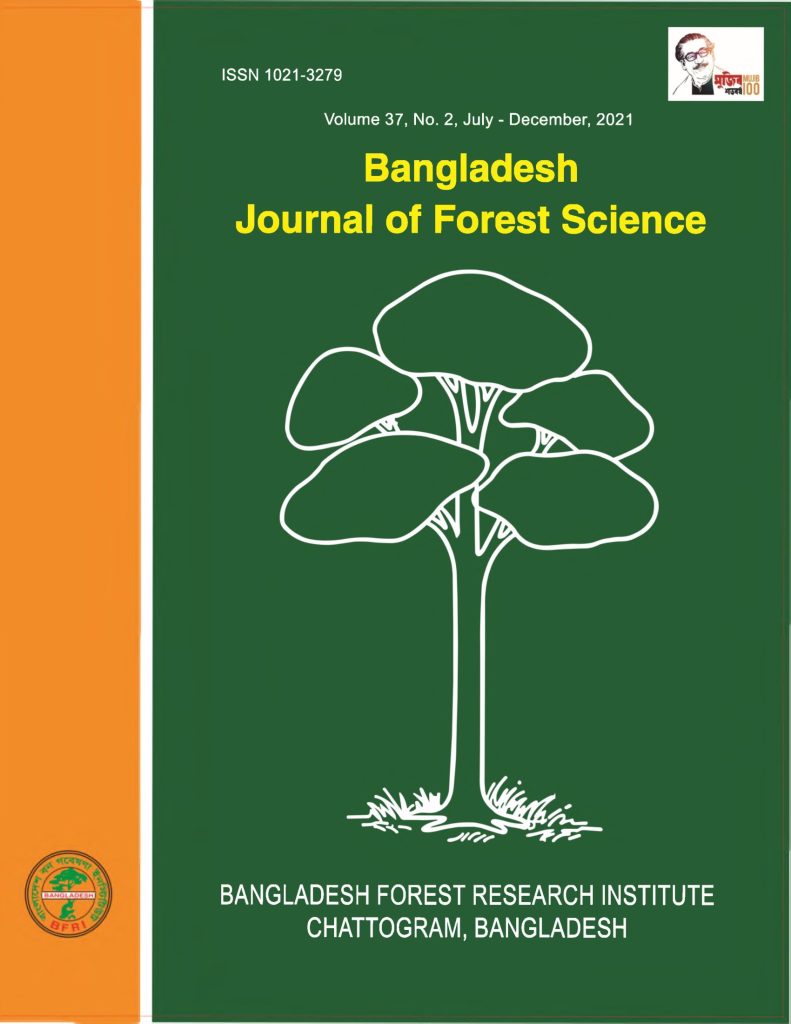Germination percentage of Tamarindus indica L. seeds were observed with 4
pre-sowing treatments viz, i) soaked in cow urine for 24 hours, ii) soaked in
cow dung slurry for 24 hours, ii) soaked in tap water for 24 hours, iv) soaked in
hot water (100 0 C) for 30 seconds and followed by one hour in tap water and v)
control, in the nursery of Bangladesh Forest Research Institute, Chattogram.
Growth performances of seedlings were also determined in nursery and field
conditions. The germination test was conducted in nursery bed filled with soil
and decomposed cow dung at a ratio of 3:1. The growth performance of
seedlings were determined by transferring the young seedling after 30-45 days
of germination having 5-6 leaves from germination bed to polybags (15 cm ×
23 cm) filled with soil mixed with cow dung. Growth performance in the field
was observed by out planting one year old seedling at 1.5 m × 1.5 m, 2.0 m ×
2.0 m and 2.5 m × 2.5 m spacing. Germination percentage was significantly
(p<0.05) influenced by pre-sowing treatments and highest germination
percentage (86%) was obtained in cow urine treatment for 24 hours and lowest
(44%) was found in hot water treatment. Growth performance of seedlings was
also influenced by pre-sowing treatments in the nursery and highest vigor index
was observed in cow urine treatment (3988) and lowest in hot water treatment
(1629). Survival percentage of seedlings was highest 98% at 2.0 m × 2.0 m
spacing in the field and average height was more than 68 cm after 12 months of
out planting. Therefore, pre-sowing treatment of seed in cow-urine for 24 hours
suggested for nursery raising and one old year seedlings may be planted at 2.0
m × 2.0 m spacing in the field for successful plantation of the species.
Germination percentage of Tamarindus indica L. seeds were observed with 4
pre-sowing treatments viz, i) soaked in cow urine for 24 hours, ii) soaked in
cow dung slurry for 24 hours, ii) soaked in tap water for 24 hours, iv) soaked in
hot water (100 0 C) for 30 seconds and followed by one hour in tap water and v)
control, in the nursery of Bangladesh Forest Research Institute, Chattogram.
Growth performances of seedlings were also determined in nursery and field
conditions. The germination test was conducted in nursery bed filled with soil
and decomposed cow dung at a ratio of 3:1. The growth performance of
seedlings were determined by transferring the young seedling after 30-45 days
of germination having 5-6 leaves from germination bed to polybags (15 cm ×
23 cm) filled with soil mixed with cow dung. Growth performance in the field
was observed by out planting one year old seedling at 1.5 m × 1.5 m, 2.0 m ×
2.0 m and 2.5 m × 2.5 m spacing. Germination percentage was significantly
(p<0.05) influenced by pre-sowing treatments and highest germination
percentage (86%) was obtained in cow urine treatment for 24 hours and lowest
(44%) was found in hot water treatment. Growth performance of seedlings was
also influenced by pre-sowing treatments in the nursery and highest vigor index
was observed in cow urine treatment (3988) and lowest in hot water treatment
(1629). Survival percentage of seedlings was highest 98% at 2.0 m × 2.0 m
spacing in the field and average height was more than 68 cm after 12 months of
out planting. Therefore, pre-sowing treatment of seed in cow-urine for 24 hours
suggested for nursery raising and one old year seedlings may be planted at 2.0
m × 2.0 m spacing in the field for successful plantation of the species.
Welcome to the Bangladesh Journal of Forest Science (BJFS) – a leading platform for advancing the knowledge and understanding of forest science in Bangladesh and beyond. Established with a commitment to excellence, BJFS serves as a cornerstone for researchers, practitioners, and enthusiasts dedicated to the sustainable management and conservation of forest ecosystems.



